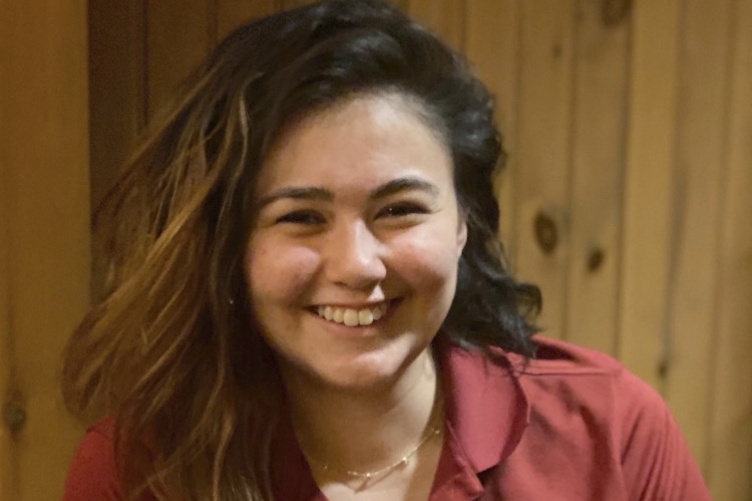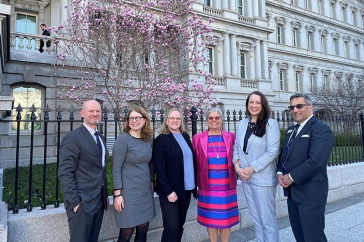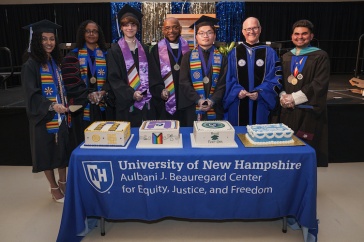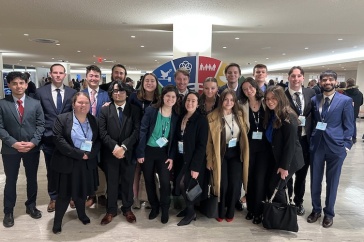
Alexandra Vergara ’23 didn’t find herself until she started pretending to be other people.
Vergara attended a small Catholic middle school in Connecticut as one of two students of color in a graduating class of roughly 10, an environment that left her feeling like “the world didn’t understand what I was,” she says.
So when she landed in the theater program at the Greater Hartford Academy of the Arts as a high schooler – a much more culturally diverse learning environment – the stage became the first place she felt truly comfortable being herself.
Even as she was actively embodying the lives of others.
“I got started in theater and I distinctly remember feeling like, oh, this is where I belong, and I had never felt that before,” Vergara says. “Theater taught me to respect and love and empathize with other people’s stories, no matter who they are. It was this really cool combination of the world opening up for me while also being taught how to open yourself up alongside it.”
Vergara brought that inclusive and compassionate worldview with her to UNH – she’s a self-described believer in radical empathy – and is already being recognized for it, having been named a 2020 Newman Civic Fellow by Boston nonprofit Campus Contact.
“I got started in theater and I distinctly remember feeling like, oh, this is where I belong, and I had never felt that before.”
Vergara is one of 290 recipients in a diverse group hailing from 39 states, Washington, D.C, Greece, Lebanon and Mexico – the largest cohort of Newman Civic Fellows to date – who were chosen for the yearlong program because of their “commitment to finding solutions for challenges facing communities locally, nationally and internationally,” according to the Campus Contact website.
A double major in English teaching and Spanish, Vergara intends to work in education in some capacity when she graduates.
“I’m so honored, and I’m really excited to be able to learn from and meet new people, and experience this other community,” Vergara says. “It’s really cool to see these young people who are as passionate as I am to be able to teach each other about issues we’re all interested in. It’s a good opportunity to be exposed to lots of different viewpoints.”
Vergara was exposed to plenty of diversity in Hartford, the state’s largest city and one of its poorest – diversity in race, socioeconomics, gender and sexual orientation. But it’s where racial diversity wasn’t particularly well-represented that most impacted Vergara, a place she ultimately found a mentor that set her on the career path she is following.
Despite the wide array of ethnicities represented in the student body at the Greater Hartford Academy of the Arts, the vast majority of the teaching faculty was white. There were two teachers of color in the theater department, and one of them, Vanessa Butler, struck Vergara in the way she reveled in the opportunity to share creative works by non-white artists in her classroom and also encouraged her students of color to fully embrace their heritage and culture.

Vergara, whose father is from Peru, had grown up living with her aunt and uncle and had never experienced that approach by an educator.
“She impacted me in ways I can’t even describe. I grew up with a white family and in white environments and she was the first person that looked at me and said, ‘You are a Latinx person. I’m not going to erase that from you.’ The empathy she extended to me was amazing,” Vergara says. “I am the person I am now because of her, and that’s why I think it’s so important for students to have people that look like them, that have the same experiences as them.”
That mentality, coupled with the welcoming world she discovered in theater, has shaped Vergara as she pursues a career she hopes can make a difference for others. To her, success in education and building community has less to do with curriculum and courses and much more to do with finding ways to understand and support each other, regardless of background.
“At the end of the day, we’re all people. We all experience different degrees of heartache and joy, and I think we can sympathize and empathize with each other based on a shared sense of humanity,” she says. “It’s so important to tell people’s stories, to step foot in another person’s shoes and have an experience of what it might feel like to live their life. How are we going to get anywhere if we don’t have those conversations?”
-
Written By:
Keith Testa | UNH Marketing | keith.testa@unh.edu
















































